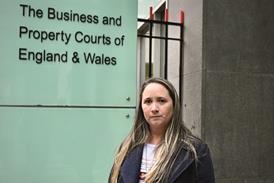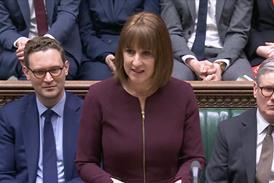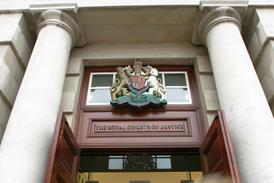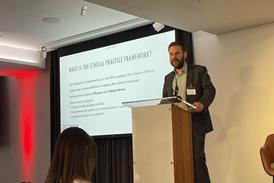Decisions filed recently with the Law Society (which may be subject to appeal)
Nicholas James Bohun
Application 12261-2021
Admitted 2010
Hearing 17 January 2022
Reasons 24 February 2022
The Solicitors Disciplinary Tribunal ordered that the respondent should be struck off the roll.
On 30 January 2020, the respondent had driven a motor vehicle after consuming so much alcohol that the proportion of it in his blood exceeded the prescribed limit, contrary to section 5(1) of the Road Traffic Act 1988 and Schedule 2 to the Road Traffic Offenders Act 1988, in breach of principles 2 and 5 of the SRA Principles 2019.
On 12 October 2020 he had driven a motor vehicle while disqualified and without insurance, contrary to sections 103(1)(b) and 143 of the Road Traffic Act 1988, and Schedule 2 to the Road Traffic Offenders Act 1988, in breach of principles 1, 2 and 5.
He had failed to notify the SRA of the offence detailed in the first allegation, thereby breaching paragraph 7.6(a) of the SRA Code of Conduct for Solicitors, RELs and RFLs and principle 2.
He had made statements to the SRA and to Rubin Lewis O’Brien LLP that he knew, or ought to have known were not accurate, did not reflect the true position and were misleading, thereby breaching principles 2, 4 and 5.
The respondent was motivated by his desire to conceal his criminal convictions and retain his employment. His conduct was aggravated by his proven dishonesty, and was deliberate and repeated. He had sought to conceal his failure to disclose his convictions and the ongoing SRA investigation by making inaccurate and misleading statements.
While the respondent had referred to being unwell and having difficult personal circumstances at the time, he had not provided any medical evidence in support.
In view of the serious nature of the misconduct, in that it involved dishonesty, the only appropriate and proportionate sanction in order to protect the public and maintain public confidence in the integrity of the profession and the provision of legal services, was to order that the respondent be struck off the roll.
The respondent was ordered to pay costs of £6,173.
Scott Ainge
Application 12274-2021
Admitted 1997
Hearing 10 February 2022
Reasons 25 February 2022
The SDT ordered that the respondent should be suspended from practice for 18 months from 10 February 2022.
While employed as a Crown prosecutor by the Crown Prosecution Service, the respondent had unlawfully accessed data held in a computer on three separate occasions, thereby breaching principles 1, 2 and 6 of the SRA Principles 2011.
On 25 October 2016 and 3 November 2016, without lawful authority, he had used the CPS CMS system to access a file from December 2014 relating to a criminal conviction of A, then the partner of his former wife. On 22 February 2017, he had accessed a different file, relating to a separate conviction of A.
He had subsequently disclosed the information within the accessed files to individuals outside the CPS who would not ordinarily have access to such information.
The respondent had been convicted of three counts of unauthorised access to a program or data held in a computer, contrary to the Misuse of Computer Act 1990 on 18 December 2020.
He had caused harm to the reputation of the profession. His conduct was aggravated by his commission of criminal offences. His actions were deliberate, calculated and repeated over a period of time. He had abused his position of power and authority to access the information. He knew that he was in material breach of his obligation to protect the public and the reputation of the profession.
In mitigation, the respondent had voluntarily notified the SRA of his charges and conviction. He had displayed genuine insight into his misconduct and was clearly remorseful. He had made open and frank admissions at an early stage and had co-operated fully with the SRA.
A definite period of suspension properly reflected the seriousness of the respondent’s misconduct. A suspension of 18 months was the appropriate and proportionate sanction.
The respondent was ordered to pay costs of £1,000.
Elizabeth Nedin
Application 12195-2021
Admitted 2013
Hearing 8-9 February 2022
Reasons 23 February 2022
The SDT ordered that the respondent should be struck off the roll.
The respondent had sought to conceal a complaint made by A, a client, in that she had failed to inform the firm’s COLP of A’s complaint; had inappropriately sent emails to A purporting to be from the firm’s COLP about the complaint; and had inappropriately deleted emails received from and sent to A, thereby breaching principles 2, 4 and 6 of the SRA Principles 2011, and failing to achieve outcomes 1.1 and 1.11 of the SRA Code of Conduct 2011. The respondent had acted dishonestly.
She had sent emails to A which had included false statements, on 3 June 2019 and on 13 June 2019, thereby breaching principles 2, 4 and 6 and failing to achieve outcomes 1.1 and 11.1 of the code. The respondent had acted dishonestly.
The respondent was motivated by self-preservation and the reputation of the firm as opposed to A’s best interests. She was highly culpable for her misconduct, which was aggravated by the fact that it was (a) dishonest, (b) calculated, (c) repeated, (d) deliberate, (e) constituted a number of individual acts over a protracted period of 23 days, and (f) she knew that what she was doing amounted to a material breach of her duty to protect the public and the reputation of the legal profession.
Direct harm had plainly been caused to A with regard to the administration of his uncle’s estate, and serious harm had been caused to the reputation of the profession.
There were a number of mitigating features to the respondent’s misconduct in that she (a) was of previous good character, (b) had demonstrated genuine insight, (c) had made open and frank admissions to the firm, the applicant and the SDT, and (d) had co-operated fully with all concerned once her misconduct had come to light.
Weighing all those factors in the balance, the misconduct found was at the highest level. In the absence of exceptional circumstances having been advanced and found, the overarching public interest required that the respondent be struck from the roll.
The respondent was ordered to pay costs of £11,400.
Omolarami Akindiji
Application 12275-2021
Admitted 2013
Hearing 15 February 2022
Reasons 15 March 2022
The SDT ordered that the respondent should be struck off the roll.
While in practice as a legal services manager at Corby Borough Council, the respondent had pursued a course of conduct whereby she submitted, or caused to be submitted, two invoices for payment to the accounts department of Corby Borough Council, in respect of AT Ltd, which contained information that she knew, or ought to have known, was misleading, thereby breaching principles 2 and 6 of the SRA Principles 2011. Her conduct was dishonest.
During an interview with her line manager and the head of internal affairs and counter-fraud at Cambridgeshire County Council, regarding an allegation of fraud made against her, the respondent had provided information that was untrue, thereby breaching principles 2 and 6. Her conduct was dishonest.
The respondent’s actions were pre-meditated and repeated in that more than one invoice was submitted for payment. The respondent’s lies about the situation were prolonged. Although the misconduct was not particularly sophisticated, it was nevertheless planned.
The motivation for the misconduct was clearly financial gain. There was a risk of harm to the reputation of the council and the potential risk of the financial loss of public funds had the invoices been paid. The reputation of the profession was seriously undermined by such conduct.
The misconduct was aggravated by the fact that when challenged the respondent had offered multiple contradictory explanations that included blaming her line manager, lack of systems, lack of knowledge and poor health. The SDT had rejected all of those explanations, as none of them were supported by any evidence. The respondent had demonstrated no insight into her conduct. The matters were aggravated by the respondent’s dishonesty.
The respondent had not advanced any exceptional circumstances and the SDT had identified none from the material before it. The only appropriate and proportionate sanction, therefore, was that the respondent be struck off the roll.
The respondent was ordered to pay costs of £22,000.
Damian John Summerscales
Application 12276-2021
Admitted 1988
Hearing 17 February 2022
Reasons 16 March 2022
The SDT granted the applicant’s application for the removal of conditions it had imposed on his practice. The respondent (the SRA) supported the application.
The applicant became a partner in Redferns in 2004. The SRA intervened into the firm in November 2016. The applicant appeared before the SDT as the second respondent in case number 11791-2018. The matter was disposed of by way of an agreed outcome.
The SDT has the power to impose conditions upon practice which is quite separate from the power of the SRA to impose conditions upon practising certificates. The SDT had ordered that the applicant should be subject to conditions imposed by it.
In January 2017, the SRA had lifted the suspension upon his practising certificate which had been activated when Redferns was intervened into, and had imposed its own conditions upon the certificate.
The applicant joined Laceys Solicitors LLP as an associate in February 2017, with the SRA’s approval. He had remained in full-time employment with Laceys for the five years preceding the hearing of the present application. In December 2020, he had been promoted to senior associate leading a small team within the family law department, which included supervision responsibilities.
On 23 November 2018, an authorised officer of the SRA removed a condition relating to approved employment on the applicant’s practising certificate, but imposed a condition preventing him from being an owner or manager of an authorised body. His 2018/19 and 2019/20 practising certificates were granted with the following conditions: (i) the applicant is not a manager or owner of an authorised body; (ii) the applicant may not act as a COLP or COFA for any authorised body; (iii) the applicant does not hold or receive client money, or act as a signatory to any client or office account, or have the power to authorise transfers from any client or office account.
The SRA decided on 21 July 2021 to issue unconditional practising certificates for the years 2020/21 and 2021/22.
Evidence had to be provided to the SDT to establish any training undertaken by the applicant or that they had kept their legal knowledge up to date in their area of practice. The original SDT had been provided with such evidence.
The SDT also had to consider evidence of any employment, together with safeguards and supervision which had been put in place by the applicant’s employer.
A senior partner in Laceys, along with the finance director, had supported the applicant’s application to the SRA for removal of the conditions upon his practising certificate.
The SDT had to consider evidence of genuine reformation of the applicant’s character, including evidence of insight into the nature and effects of the misconduct, and steps taken by the applicant to ensure that the wrongdoing did not reoccur.
The applicant had shown genuine insight into the misconduct which had led to the conditions being imposed upon his practice. There had been no regulatory issues during his time at Laceys.
Based on the evidence before the SDT, there was no continuing risk to the public or that the public would harbour concerns about the propriety of the removal of the conditions. There was convincing evidence that the conditions had been complied with. The conditions should accordingly be removed.
The applicant was ordered to pay costs of £725.
Marlan Higgins
Application 12192-2021
Admitted 2002
Hearing 3 February 2022
Reasons 24 February 2022
The SDT refused the applicant’s application for the determination of the indefinite suspension imposed by it on his practice following a hearing on 13 December 2012.
The applicant’s firm, Legal Advice Direct Solicitors, had ceased trading on 30 October 2009.
The applicant had breached section 34(2) of the Solicitors Act 1974 and rule 36(5) of the Solicitors Accounts Rules 1998 by failing to deliver the cease to hold accountant’s report in relation to his practice by its due date of 30 April 2010.
He had failed to deal with the SRA in an open, prompt and co-operative way in breach of rule 20.05(1) of the Solicitors Code of Conduct 2007.
The SRA had written to the applicant on three occasions between May 2010 and May 2011. He had not responded until August 2011 and had never provided the report.
The applicant had been referred to the SDT. On 13 December 2012 the matter had been listed for a substantive hearing, which had proceeded in the applicant’s absence.
The SDT recognised that the matters that had resulted in the indefinite suspension being imposed were serious, though it accepted that there had been no allegation of dishonesty or lack of integrity. Nevertheless, failing to co-operate with the regulator was a fundamental breach of a solicitor’s obligations.
Suffering from mental illness should not prevent anyone from being part of the profession. The difficulty in the present case was that the applicant had not provided a medical report in support of his application, so the SDT could not assess whether his health had recovered sufficiently such that it could withstand the pressures of a return to practice.
Faced with the application as it had been presented, the SDT could not be satisfied that there would be no adverse effect on the reputation of the legal profession or the interests of the public if the applicant’s suspension was terminated, and therefore refused the application.
The applicant was ordered to pay costs of £2,100.




























